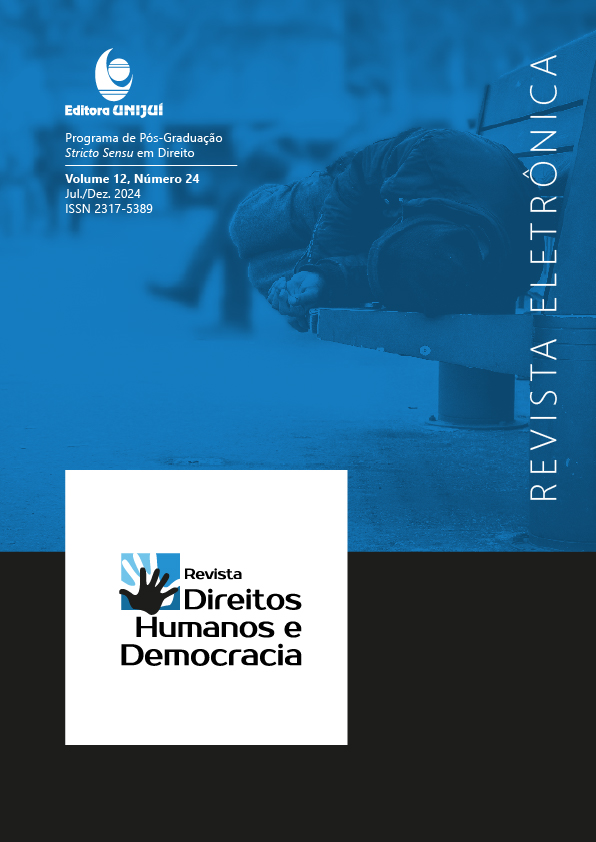Benefit-sharing system and the biodiversity framework: The issue of intellectual property and environmental justice
DOI:
https://doi.org/10.21527/2317-5389.2024.24.16215Keywords:
Biodiversity, Benefit-Sharing System, Intellectual Property, Biodiversity Framework, Environmental JusticeAbstract
This research aims to analyze the access and benefit-sharing system, as well as the issue of intellectual property and environmental justice. The research problem is based on whether the system implemented by the Biodiversity Framework aligns with the principles of justice and equity as required by law and international agreements. The investigation employs a methodological approach based on the texts of international standards, national legislation, and data access from patent monitoring databases. By analyzing the data provided in contrast with national legislation and other international documents, it is possible to assert that there is, in fact, no fair and equitable benefit-sharing. In conclusion, it is evident that the benefit-sharing system implemented in Brazil still requires better structuring, as well as the establishment of clearer criteria and a stronger connection with the intellectual property protection system, as the current practices fall short of meeting the dictates of environmental justice.
References
ABRAMOVAY, Ricardo. Amazônia: por uma economia do conhecimento da natureza. São Paulo: Elefante, 2019.
ACSELRAD, Henri; HERCULANO, Selene; PÁDUA, José Augusto. Justiça ambiental e cidadania. Rio de Janeiro: Relume Dumará, 2004.
BRASIL, Ministério do Meio Ambiente. Disponível em: https://www.gov.br/mma/pt-br/assuntos/biodiversidade/patrimonio-genetico/conselho-de-gestao-do-patrimonio-genetico-cgen-1/normas-do-cgen/deliberacoes. Acesso em: maio 2024.
BRASIL, Ministério do Meio Ambiente. Disponível em: https://www.gov.br/mma/pt-br/assuntos/biodiversidade/patrimonio-genetico/conselho-de-gestao-do-patrimonio-genetico-cgen-1/normas-do-cgen/DeliberaoCGenn55de02_10_2019.pdf. Acesso em: dez 2023.
BRASIL, Ministério do Meio Ambiente. Relatório de Atividades – Autorizações de acesso ao patrimônio genético e ao conhecimento tradicional associado concedidos em 2014. Disponível em: https://www.gov.br/mma/pt-br/assuntos/biodiversidade/patrimonio-genetico/conselho-de-gestao-do-patrimonio-genetico-cgen-1/atividades-do-cgen-durante-a-vigencia-da-mp-no-2-186-16-2001. Acesso em: outubro 2022.
BRASIL, Ministério do Meio Ambiente. Solicitação Dados Portal Fala.br -Sistema Eletrônico do Serviço de Informação. [mensagem pessoal] Mensagem recebida por: . em: 06 set. 2021.
BURBALLA-NORIA, Alfred. Environmental justice claims and dimensions in anti-megaproject campaigns. In: The Right to Nature. Routledge, 2018.
CAMILO, Julcéia. Copaifera langsdorffii – Copaíba in: Espécies nativas da flora brasileira de valor econômico atual ou potencial: Plantas para o Futuro: Região Centro-Oeste / Ministério do Meio Ambiente. Secretaria de Biodiversidade; Roberto Fontes Vieira (Ed.). Julcéia Camillo (Ed.). Lidio Coradin (Ed.). – Brasília, DF: MMA, 2016
CNI – CONFEDERAÇÃO NACIONAL DA INDÚSTRIA. Acesso e repartição de benefícios no cenário mundial: a lei brasileira em comparação com as normas internacionais / Confederação Nacional da Indústria, GSS Sustentabilidade e Bioinovação, Natura Inovação e Tecnologia de Produtos – Brasília: CNI, 2017.
DE CAMARGO TOZATO, Heloisa et al. Gastos Federais com Acesso e Repartição de Benefícios da Biodiversidade no Brasil (2001-2020). Revista Gestão & Políticas Públicas, v. 11, n. 1, p. 1-23, 2021.
IOCCA, L. Conhecimentos Tradicionais, Patrimônio Imaterial e Repartição Justa dos Benefícios: Uma Análise dos Sistemas de Proteção no Contexto Latino-Americano. InSURgência: revista de direitos e movimentos sociais, v. 5, n. 1, p. 254-279, 24 dez. 2019.
LENS. Patent Search. In: The Lens, 2021. Disponível em: https://www.lens.org/lens/search/patent/list. Acesso em: 8 dez. 2021.
LUNA, Thayssa Izetti. Fundo Nacional de Repartição de Benefícios: instrumento eficaz e eficiente da política de acesso e proteção ao patrimônio genético e conhecimento tradicional associado? 2020. Disponível em: https://repositorio.unb.br/handle/10482/39104
NATURA (Brasil). Relatório Anual Natura. Brasil: Natura, 2019. 154 p. Disponível em: https://static.rede.natura.net/html/home/2020/br_05/relatorio-anual/relatorio_anual_natura_2019.pdf. Acesso em: 23 jan. 2020.
ORBIT. 2021. Gráfico. Disponível em: https://www.questel.com/patent/ip-intelligence-software/orbit-intelligence/. Acesso em: 22 nov. 2021.
TORRE-SCHAUB, Marta. Quelques apports à l’étude de la notion de justice environnementale. Changements environnementaux globaux et Droits de l'Homme, 2012.
SHIVA, Vandana. Biopirataria: a pilhagem da natureza e do conhecimento. Trad. De Laura Cardellini B. de Oliveira. Petrópolis, RJ: Vozes, 2001.
SISTEMA de Informação sobre a Biodiversidade Brasileira. In: Sistema de Informação sobre a Biodiversidade Brasileira: Espécies medicinais nativas. Brasil, 2021. Disponível em: https://specieslist.sibbr.gov.br/native-plants?fq=kvp%20group:Medicinais&lang=pt_BR. Acesso em: 21 dez. 2021
VIEIRA, Neide K. Baccharis dracunculifolia Vassourinha in Espécies nativas da flora brasileira de valor econômico atual ou potencial: plantas para o futuro – Região Sul / Lidio Coradin; Alexandre Siminski; Ademir Reis. – Brasília: MMA, 2011
Downloads
Published
How to Cite
Issue
Section
License
Copyright (c) 2024 Human Rights and Democracy Journal

This work is licensed under a Creative Commons Attribution 4.0 International License.
By publishing in the Revista Direitos Humanos e Democracia, authors agree to the following terms:
Articles are licensed under the Creative Commons Atribuição 4.0 Internacional (CC BY 4.0), which allows:
Share — copy and redistribute the material in any medium or format;
Adapt — remix, transform, and build upon the material for any purpose, including commercial use.
These permissions are irrevocable, provided the following terms are respected:
Attribution — authors must be properly credited, with a link to the license and indication of any modifications made;
No additional restrictions — no legal or technological measures may be applied that restrict the use permitted by the license.
Notices:
The license does not apply to elements in the public domain or covered by legal exceptions.
The license does not grant all rights required for specific uses (e.g., image rights, privacy, or moral rights).
The journal is not responsible for opinions expressed in the articles, which remain the sole responsibility of the authors. The Editor, with the support of the Editorial Committee, reserves the right to suggest or request modifications when necessary.
Only original scientific articles presenting research results of interest, not previously published or simultaneously submitted to another journal with the same purpose, will be accepted.
References to trademarks or specific products are intended solely for identification purposes and do not imply any promotional endorsement by the authors or the journal.
License Agreement: Authors retain copyright over their articles and grant the Revista Direitos Humanos e Democracia the right of first publication.













